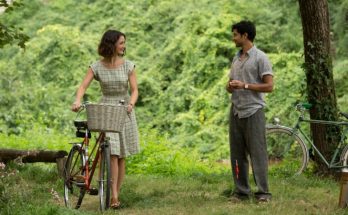 ‘Wadjda,’ Haifaa Al Mansour is making history this year with a film that tackles Quranic memorization. So far, so traditional, but the fact that this is Saudi movie that, for the first time ever, has a woman at the helm, is enough to put it in the history books.
‘Wadjda,’ Haifaa Al Mansour is making history this year with a film that tackles Quranic memorization. So far, so traditional, but the fact that this is Saudi movie that, for the first time ever, has a woman at the helm, is enough to put it in the history books.
Female empowerment is at the heart of Wadjda. Telling the story of a young girl determined to win a Quran recitation contest so that she can buy a much coveted green bike to beat her friend Abdullah in a race, the film is also ground breaking in its casting of a female lead. Given that women in Saudi Arabia are forbidden from riding bikes in public unchaperoned, from the outset, it’s clear that Al Mansour isn’t afraid to push boundaries.
[youtube height=”HEIGHT” width=”WIDTH”]http://www.youtube.com/watch?feature=player_embedded&v=neU-ycIOCWY[/youtube]
Al Mansour stated that she wanted to “create a story where people can laugh and cry a little,” and though the repressive religious orthodoxy in the Kingdom is cited as a reason for oppression of women, through the religious contest, the film’s heroine is able to acquire the means to empower herself to challenge authority.
“It’s difficult for a male filmmaker to break into this secluded world and have the same opportunities I had.”
The film also shows the ways in which women, not only men, act to keep traditional restrictive gender dichotomies in place. In an interview with the Financial Times, Al Mansour said, “It was very important for me to show that even women reinforce traditional values and that it is not only men. The usual refrain is that the men are always the oppressors and the women are always victims, but the situation is more complex than that.”
She was determined to film in Saudi Arabia to ensure a fully authentic cinematic experience, however Al Mansour admits she faced some challenges along the way. Due to the fact that women and men are banned from interacting in public, when directing outdoor scenes, she had to resort to directing male actors with telephones and walkie-talkies.
Conversely, her femininity also allowed her to portray the women of Saudi Arabia as never before, free from burkas or screens- something that she notes would be unthinkable for a male director. She commented; “It’s difficult for a male filmmaker to break into this secluded world and have the same opportunities I had.”



